
Recovering After a Natural Disaster
A disaster can happen at any time, and anywhere. Today, natural disasters are happening in many unsuspected areas of the world. For instance, a tornado in the midwest is not an uncommon occurrence anymore. While a fire on the west coast happens at least once a year. A water disaster (i.e., flood) can strike any city in a low lying area with inadequate drainage. However, what’s most tragic is that many victims of natural disasters don’t take the necessary precautions to protect their family, home, and property before a natural disaster occurs. Methods of protecting and preparing for the inevitable, should be taken seriously.
Every year, city and state Emergency Preparedness Divisions issue warnings for pending natural disasters and provide effective ways that residents can safeguard themselves, their loved ones, and their property against the impending disaster. For instance:
1. Plan an escape route
Before an emergency situation strikes, families should devise an escape plan to ensure that everyone exits the home when necessary, and meets in a central location. This is especially advisable during a home fire. During an announced hurricane, this plan could be beneficial if all family members are not home when disaster strikes.
2. Know the warning signs
Many people do not know the warning signs of a tornado. First learn them, and teach your entire family to be vigilant. Find out where the nearest shelter is in your area. Tornadoes often strike quickly and without much warning, so establish a safe shelter in your home (i.e., basement, interior ground floor shelter such as a closet or hallway, and stay clear of windows, outside walls and doors).
3. Falling and loose storm debris
After a serious storm, watch out for debris, roofing shingles, nails, and objects that could cause injury from above. Monitor the emergency radio system, and wait for signals from the local authority before attempting any clean up effort. There may be down power lines that you are not aware of. Never start any clean up until you have an all clear for the authorities.
4. Heed evacuations
In the event of flooding, tsunami, or hurricane, be attentive to emergency information, and especially for evacuations. In large cities, there may be several evacuation routes, with one closest to you. If time allows, board up the house as best you can, and secure the windows. Have a supply of drinking water, and non perishable foods that will fit in the vehicle, and carry a portable first aid kit. After the flooding, do not return home until you are advised to do so. If the home is non livable, stay in contact with emergency preparedness for shelter instructions. For a tornado, fire, or flooding, every precaution should be taken to provide safe evacuation of the family and pets. Do not, under any circumstances, try to ride out a storm.
One of the most important things to do in the case of a natural disaster is not to tie up emergency information lines with inquiries. Everything will be broadcast over the emergency broadcast system.



